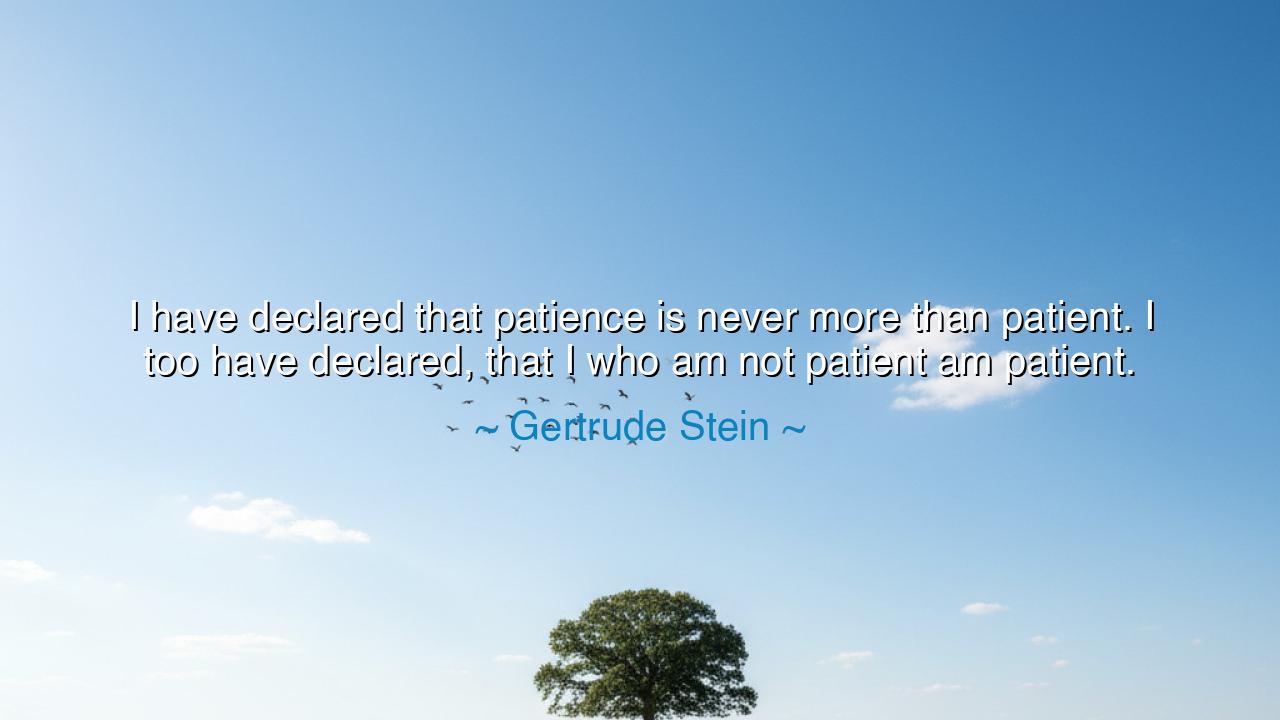
I have declared that patience is never more than patient. I too
I have declared that patience is never more than patient. I too have declared, that I who am not patient am patient.






The words of Gertrude Stein—“I have declared that patience is never more than patient. I too have declared, that I who am not patient am patient.”—flow like a paradox, a riddle uttered in the voice of one who has lived long in contemplation. She speaks of patience, that ancient virtue praised by prophets, philosophers, and poets alike. Yet she does not adorn it with false grandeur, nor does she veil it with elaborate praise. Instead, she tells us that patience is never more than patient—that it is simple, bare, without disguise. It is what it is, neither more nor less, a quiet flame that does not need the noise of other virtues to announce its power.
In her second declaration, Stein reveals the struggle of every soul: “I who am not patient am patient.” This is the confession of one who knows that to live is to wrestle with contradiction. For what mortal is truly patient at all times? Who does not burn with the urge for immediacy, for results, for answers in the moment? And yet, by living, by enduring, by walking forward despite the unrest of the heart, even the impatient may be found practicing patience. Thus, Stein teaches us that patience is not a gift reserved for saints alone; it is born in the tension between desire and endurance, between yearning and waiting.
To understand her meaning, let us recall the tale of Abraham Lincoln, who in his early years suffered defeat after defeat. He lost elections, failed in business, endured personal grief and despair. By his own admission, he was not a man of endless calm; he felt the sting of failure deeply, and at times despaired of his own future. Yet by continuing—by rising again and moving onward—he proved himself patient, though he may not have called himself so. His life demonstrates Stein’s paradox: one may feel no patience, yet by enduring the long road without abandoning it, one becomes the very embodiment of it.
Stein’s words strip patience of false ornament. She does not call it heroic, nor romantic. She tells us only this: patience is patient. It does not need to be decorated with lofty names. It is not always triumphant, nor does it always glow like fire. Often, it feels dull, heavy, like waiting in silence. Yet it is precisely in its simplicity that its power lies. Patience does not conquer in a single stroke; it wears down mountains with time, it outlasts storms with stillness, it endures until endurance itself becomes victory.
Thus, the paradox of her confession teaches us that we too may claim patience even when we feel none. To wait though restless, to persevere though weary, to continue though disheartened—this is patience hidden beneath impatience. In this way, Stein comforts the restless soul: you need not feel serene to be enduring; you need not believe yourself patient to act with patience. The act itself, not the feeling, is what matters.
The lesson for us, then, is to see patience as practice, not perfection. Do not wait for your heart to feel calm before you endure. Do not demand serenity before you move steadily forward. Simply remain. Simply persist. Even in your restlessness, if you continue, you have been patient. The world does not require that you be unshaken—it requires only that you endure the shaking without surrender.
In practical life, this means: when failure visits, rise again though your spirit protests. When waiting seems endless, keep walking, even if each step feels reluctant. When others falter, be the one who holds steady, though inside you burn with doubt. Write the book though your hand trembles with uncertainty. Stay the course though your heart cries for escape. Patience is patient—it requires no other name, no embellishment, no perfection of feeling. It requires only that you continue.
So take Stein’s words as a mirror: though you may feel restless, though you may declare yourself impatient, if you endure you have lived patience itself. And when the trials of life press upon you, remember that the greatest strength is often not in dazzling triumph, but in the quiet, stubborn persistence of one who stays, one who endures, one who, though not patient, is patient. That is the wisdom of Stein.






AAdministratorAdministrator
Welcome, honored guests. Please leave a comment, we will respond soon